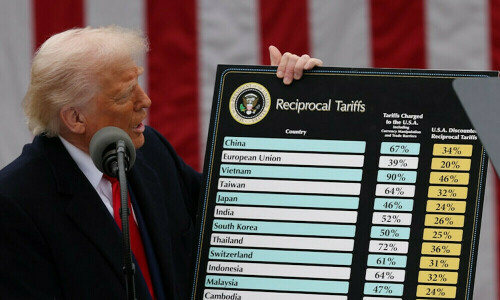IMF Warns of Impact of US Tariffs on Pakistan’s Economy
The International Monetary Fund (IMF) has expressed concerns that the recently implemented reciprocal tariffs by the United States could negatively impact Pakistan’s exports and overall economic expansion.
In its recent report, the IMF highlighted potential adverse effects on Pakistan’s financial standing. The report, titled “First review under the Extended Fund Facility (EFF) arrangement, requests for modification of performance criteria, and request for an arrangement under the Resilience and Sustainanble Facility (RSF),” suggests that these tariffs and subsequent market reactions could hinder Pakistan’s export capabilities and gross domestic product (GDP). The report forecasts a slight downward revision in growth for FY25 and a reduction of approximately 0.3 percentage points in FY26.
On April 2, 2025, the US government declared substantial increases in tariffs on specific nations, which included a 29% tariff imposed on goods from Pakistan.
Despite the fact that Pakistan’s export sector makes up a relatively small proportion of its GDP (approximately 10%), the United States stands as Pakistan’s primary trading partner, with textiles and apparel representing a significant portion of this trade.
The report further noted that while tariff adjustments may occur following negotiations, a considerable number of Pakistan’s competitors in these product categories, such as Bangladesh (37%), China (145%), India (26%), and Vietnam (46%), are also encountering substantial tariffs.
The IMF has established 11 new structural benchmarks for Pakistan under the $7 billion Extended Fund Facility (EFF).
The IMF also drew attention to broader, less direct consequences. Besides the immediate effect on Pakistan’s exports to the US, the report indicates that Pakistan may experience indirect repercussions. These could stem from the effects of tariffs on Pakistan’s other trading partners, tighter conditions in global financial markets, potential decreases in remittances, and amplified uncertainty in trade policies.
According to the IMF, the overall impact on Pakistan’s balance of payments is anticipated to be lessened by recent decreases in commodity prices and reduced economic activity, which will subsequently lower Pakistan’s import costs.
The IMF observed that Pakistan’s sovereign spreads have seen a sharp rise since April 2. However, near-term market access to external financing remains constrained, thereby diminishing any immediate consequences.
The report emphasizes that should outflow pressures intensify, allowing the exchange rate to adjust will be crucial.
Additionally, the report projects a modest net impact on inflation, with some downward pressure expected due to diminished commodity prices and weakened economic growth.
Last month, Finance Minister Muhammad Aurangzeb stated in an interview that Pakistan aims to increase its procurement of goods from the US and eliminate non-tariff barriers to mitigate the impact of elevated tariffs imposed by the US.



Comments (0)
No comments yet. Be the first to comment!
Leave a Comment